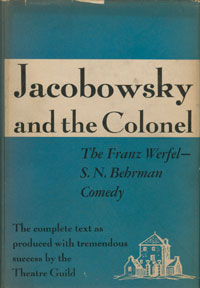|
 |
Jacobowsky and the Colonel
S. N. Behrman
New York:
Random House, 1944
First edition in dust jacket
Inscribed by Behrman |
| |
|
(On front free endpaper)
For Burton Tripp, / Wish there
were more / policemen like him! / With appreciation,
/ from / S N Behrman. / New York: June 1944.
Signed by cast members
of the original Broadway production, including Louis
Calhern, Edward Kreisler, Louise Dowdney, E.G.
Marshall, Annabella, Harold Vermilyea, Bob Merritt,
Donald Lee, Coby Ruskin, Kitty Mattern, Herbert
Yost, Frank Overton, William W. Sanders, J. Edward
Bromberg, Philip Coolidge, Jules Leni, Harry Davis,
Joseph Kallini, and Bettina Cerf (the Assistant
Stage Manager).
Burton Tripp played
a gendarme in the original Broadway production.
|
|
| Relations within
the ranks of the Playwrights’ Company became further
strained in 1944 with Jacobowsky and the Colonel.
Excited by Behrman’s interest in his dinner-table anecdote
one evening in Hollywood, Franz Werfel attempted to
dramatize his own plot. Thwarted, he elicited further
assistance from the Theatre Guild, who promptly set Clifford
Odets to work. The project foundered. Behrman, who, rightly
or wrongly, claimed inheritance to Werfel’s "idea" beyond
the extension of The Playwrights’ Company’s purview, and the
Theatre Guild, who asserted absolute rights to any work
emanating from Werfel’s concept, joined independent forces
in a presentation that emerged as a commercial success for
all, winning for Behrman and Werfel the New York Drama
Critics Circle Award for Best Foreign Play of 1944 – the
only theatrical award presented to Behrman in his lifetime –
but also rupturing Behrman’s relationship with author
Werfel. If, in the Guild’s omniscience, they first
determined Odets to be the perfect collaborator, then it
remains small wonder that Werfel would find Behrman’s
audaciously saucy, tragi-comic interpretation wanting.
Ultimately Werfel wrote his own lugubrious play taking the
same title. S.L. Jacobowsky, a Polish Jew always just one
step ahead of the advancing Nazis, finds himself at a
seeming dead end in Paris following his flight from Vienna.
There remains only the option of the purchase of an
outrageously priced automobile, and while Jacobowsky has
funds, he cannot drive. The eternal optimist, he completes
the exchange. Chance introduces him to Tadeusz Boleslav
Stjerbinsky, a colonel of the Polish Army, determined to
join loyal exiles in England. Stjerbinsky has no mode of
transportation to the coast, but he is skilled at driving an
automobile. He is also intolerant of Jews. Nonetheless
Jacobowsky sets out with the colonel. Too late he discovers
that the colonel is also a romantic, whose affair of the
heart brings the odd-couple travelers on a circuitous route
and within kilometers of the German Army merely to rescue
Marianne, the colonel’s soul mate. Complications ensue when
Marianne indicates a fondness for Jacobowsky, much to the
colonel’s fury; but before the gentlemen can complete an
honorable duel, they are discovered by a Nazi patrol. Wits
and luck preserve them, and the final curtain falls on a
now-tolerant colonel and Jacobowsky sailing to safety across
the English Channel. |
|